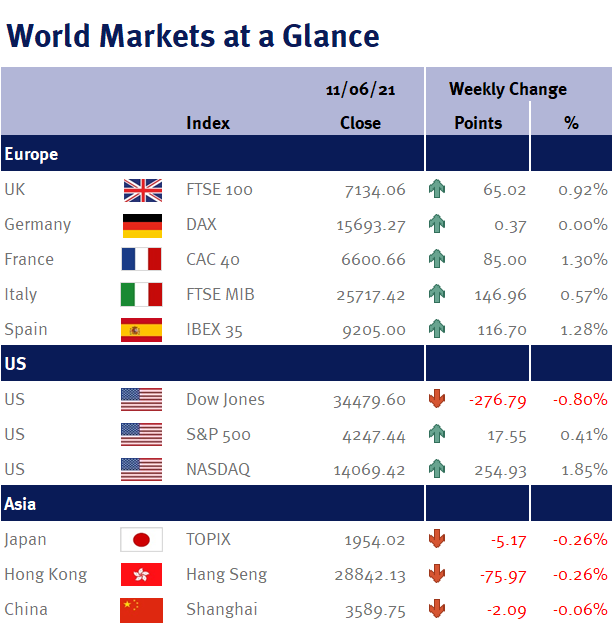Yesterday’s (10 June 2021) US CPI inflation data was this week’s focal point – and as we forecasted in our last market update (please see here), although the inflation reading did show a big year-on-year increase, thankfully, as we hoped, it turned out to be much ado about nothing as most of the major global equity markets ended the week slightly higher.
Week ending 11th June 2021.
14th June 2021

Although the headline US CPI inflation reading of 5.0% in May (versus 4.2% in April) was eye popping and headline grabbing, in addition to the distortions from last year’s commodity prices and used car prices (which rose 7.3% in May alone as semiconductor supply chain issues continue to impact new car production), the biggest contributors to the increase came from categories associated with an economic re-opening, such as airfares (which rose 7.0% in May) and clothing.
In fact, looking at the year-on-year increases, petrol prices are 56.2% higher; energy prices +28.5%; used cars +29.7%; airfares +24.1%; and food away from home (i.e. restaurants) +4.0%.
Categories that aren’t associated with an economic reopening, such as food at home (cereals, meat, diary, fruit & veg, etc.); alcohol; and housing (rent), painted a more benign inflation picture with year-on-year increases of just 0.7%; 1.6%; and 1.8% respectively.
As a consequence, yesterday’s inflation data further cements our view that the markets’ concerns about out-of-control inflation (which will result in significantly higher interest rates) is unwarranted: the current inflationary pressures are temporary and will quickly fade – and as such, the Fed (along with other central banks, such as the BoE, ECB and BoJ) will remain accommodative by keeping interest rates low.
Furthermore, data from University of Michigan early today (Friday 11 June 2021) indicated that American consumers are also coming around to the view that the current rise in inflation is transitory (which is positive as it means that high inflation expectations won’t become entrenched), as inflation expectations on both a near term (1 year) and longer-term (5-10 years) declined to 4.0% (from 4.6%) and 2.8% (from 3.0%) respectively.
Elsewhere, the ECB as expected kept Eurozone interest rates unchanged – and although their inflation forecasts for 2021 & 2022 were revised significantly upwards to 1.9% (from 1.5%) and 1.5% (from 1.2%) respectively, they too clearly believe it is transitory as their 2023 forecast remained unchanged at 1.4%.
Looking ahead to this coming week we have monetary policy meeting announcements and press conferences from two central banks (the Fed and BoJ). While both will get a lot of coverage, we aren’t expecting any major surprises.
Data-wise, we have UK employment (unemployment rate and weekly earnings); UK & Japanese CPI inflation; US, UK & Chinese retail sales; US & Eurozone industrial production; and US housing data.
Investment Management Team
The latest market updates are brought to you by Investment Managers & Analysts at Wealth at Work Limited which is a member of the Wealth at Work group of companies.
Links to websites external to those of Wealth at Work Limited (also referred to here as 'we', 'us', 'our' 'ours') will usually contain some content that is not written by us and over which we have no authority and which we do not endorse. Any hyperlinks or references to third party websites are provided for your convenience only. Therefore please be aware that we do not accept responsibility for the content of any third party site(s) except content that is specifically attributed to us or our employees and where we are the authors of such content. Further, we accept no responsibility for any malicious codes (or their consequences) of external sites. Nor do we endorse any organisation or publication to which we link and make no representations about them.

